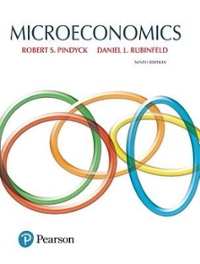Question
Section 1 1) When an economist talks about utility, she is talking about a company that provides electricity, water, gas, etc. the satisfaction, in terms
Section 1
1)When an economist talks about utility, she is talking about
| a company that provides electricity, water, gas, etc. | |
| the satisfaction, in terms of price, that a producer receives from selling his product. | |
| the satisfaction that results from the consumption of a good. | |
| the amount of one good that a person is willing to give up in order to get a unit of another good. | |
| the satisfaction that results from the consumption of a good minus the price that must be paid to get the good. |
2)Total utility is defined as the
| change in total utility a person derives from the consumption of a good divided by the price of that good. | |
| change in total utility a person derives from the consumption of a good divided by the price of that good. | |
| change in total utility a person derives from the consumption of a good divided by the change in the consumption of that good. | |
| sum of the amounts of satisfaction a person receives from consuming a good. | |
| change in total utility a person derives from the consumption of a good. |
3)The law of diminishing marginal utility says that
| the marginal utility gained by consuming equal successive units of a good will decline as the amount consumed increases. | |
| the total utility gained by consuming equal successive units of a good will decline as the amount consumed increases. | |
| the more of a particular good one consumes, the greater is the utility received from the consumption of that good. | |
| the marginal utility gained by consuming equal successive units of a good will increase as the amount consumed increases. | |
| the more of a particular product one sells, the less utility one receives from selling. |
4)Because there are so few diamonds in the world, the consumption of diamonds
| takes priority over the consumption of water. | |
| takes place at relatively high marginal utility. | |
| takes place at relatively low marginal utility. | |
| is more important than the consumption of water. |
5)To an economist, utility refers to the
| usefulness of a good or service. | |
| satisfaction that results from the consumption of a good. | |
| relative scarcity of a good. | |
| rate of decline in the demand curve. |
6)A util is an artificial construct used as a means of measuring the
| price of a good. | |
| satisfaction one receives from the consumption of a good. | |
| costs of producing a good. | |
| difference between the price and the value of a good. |
7)Marginal utility is defined as the
| change in marginal utility a person derives from the consumption of a good. | |
| change in total utility a person derives from the consumption of a good divided by the price of that good. | |
| change in total utility a person derives from the consumption of a good divided by the change in the quantity of the good consumed. | |
| sum of the amounts of satisfaction a person receives from consuming a good. | |
| change in total utility a person derives from the consumption of a good divided by the value in use of that good. |
8)
Suppose you are eating slices of pizza and after consuming the first slice you receive 14 utils of total utility, after the second you receive 22 utils of total utility, and after the third 25 utils of total utility. Then
| the law of diminishing marginal utility is not applicable because your total utility is increasing instead of diminishing. | |
| your total utility is 61 utils. | |
| your total utility is 25 utils, and the marginal utility of the first slice is 8 utils (22 - 14). | |
| your total utility is 25 utils, and the marginal utility of the third slice is 3 utils. |
9)We would expect the total utility of diamonds to be __________ than the total utility of water and the marginal utility of diamonds to be __________ than the marginal utility of water.
| higher; higher | |
| lower; lower | |
| higher; lower | |
| lower; higher |
10)The theory of consumer choice assumes that consumers attempt to maximize
| the difference between total utility and marginal utility. | |
| average utility. | |
| total utility. | |
| marginal utility. |
11)If the marginal utility of a good is negative, then
| consumers should buy less of it. | |
| consumers will consume it only if it is free. | |
| consumers should buy more of it to make its marginal utility positive. | |
| the law of diminishing marginal utility is being violated. |
12)To economists, utility means
| marginal value. | |
| relative value. | |
| satisfaction. | |
| usefulness. | |
| a, c, and d |
13)If income rises, the budget constraint
| moves inward toward the origin. | |
| moves outward away from the origin. | |
| does not move. | |
| moves farther down the vertical axis. |


Step by Step Solution
There are 3 Steps involved in it
Step: 1

Get Instant Access to Expert-Tailored Solutions
See step-by-step solutions with expert insights and AI powered tools for academic success
Step: 2

Step: 3

Ace Your Homework with AI
Get the answers you need in no time with our AI-driven, step-by-step assistance
Get Started


